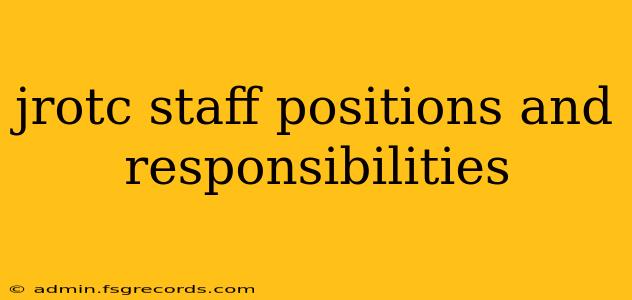The Junior Reserve Officers' Training Corps (JROTC) program relies heavily on a dedicated and skilled staff to guide and mentor cadets. This post details the common staff positions within a JROTC unit and outlines their respective responsibilities, providing a comprehensive understanding of the team dynamics behind a successful program. Understanding these roles is crucial for both current JROTC cadets and those considering joining.
Key Staff Positions and Their Roles
A typical JROTC unit's staff is comprised of several key positions, each with specific responsibilities contributing to the overall success of the program. The specific titles and responsibilities might vary slightly between schools and branches of service (Army, Navy, Air Force, Marine Corps), but the core functions remain consistent.
1. Senior Army Instructor (SAI) / Senior Naval Science Instructor (SNSI) / etc.
- Responsibility: The SAI (or equivalent for other branches) is the leader of the JROTC unit. They are responsible for the overall management, curriculum implementation, and supervision of all activities. This includes:
- Curriculum Oversight: Ensuring the JROTC curriculum is followed and adapted appropriately.
- Staff Supervision: Managing and mentoring the other instructors and staff members.
- Budget Management: Overseeing the unit's budget and resource allocation.
- Community Relations: Building and maintaining positive relationships with the school administration, parents, and the wider community.
- Cadet Welfare: Ensuring the safety and well-being of all cadets.
- Reporting & Compliance: Meeting all reporting requirements mandated by the JROTC program and the school district.
2. Assistant Senior Army Instructor (ASAI) / Assistant Senior Naval Science Instructor (ASNCI) / etc.
- Responsibility: The ASAI (or equivalent) acts as the second-in-command, assisting the SAI in all aspects of running the JROTC unit. This often involves:
- Curriculum Support: Assisting in the delivery of the curriculum and overseeing specific cadet activities.
- Staff Delegation: Assisting the SAI in managing and delegating tasks to other staff members.
- Mentorship: Providing additional mentorship and guidance to cadets.
- Event Planning & Execution: Taking a lead role in the planning and execution of JROTC events.
3. JROTC Instructor
- Responsibility: JROTC Instructors are responsible for delivering specific parts of the curriculum, often specializing in areas like leadership development, drill and ceremonies, marksmanship, or physical training. They are instrumental in:
- Curriculum Delivery: Teaching specific JROTC subjects to cadets.
- Cadet Mentorship: Providing individual and group mentorship to cadets.
- Activity Supervision: Supervising cadets during extracurricular activities.
- Grading and Assessment: Evaluating cadets' performance and providing feedback.
4. Administrative Staff
- Responsibility: While not always a dedicated position, administrative tasks are crucial for the smooth operation of the JROTC program. These tasks may include:
- Record Keeping: Maintaining accurate records of cadet participation, grades, and activities.
- Communication: Facilitating communication between the staff, cadets, parents, and school administration.
- Logistics: Managing supplies, equipment, and uniforms.
Beyond the Formal Roles: Mentorship and Leadership
It is important to note that beyond the formal titles and responsibilities, the JROTC staff cultivates a strong culture of mentorship and leadership. All staff members play a significant role in shaping the character and development of the cadets, fostering personal growth, teamwork, and civic engagement. The emphasis is not simply on teaching the curriculum but on developing well-rounded individuals who are prepared for future success.
Conclusion
The success of a JROTC program rests on the collective efforts of its staff. Each position contributes essential skills and expertise, creating a supportive environment for cadets to learn, grow, and thrive. Understanding the roles and responsibilities outlined above provides valuable insight into the vital contribution of JROTC staff to the development of future leaders.

